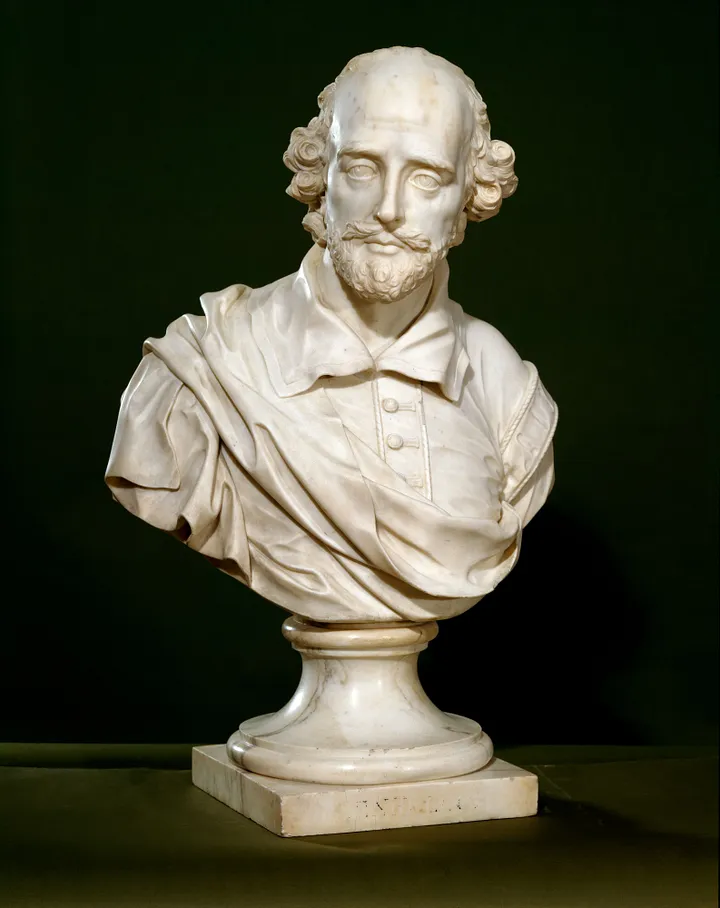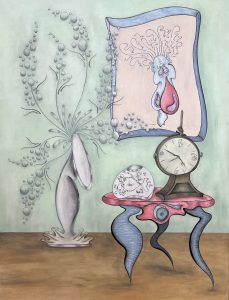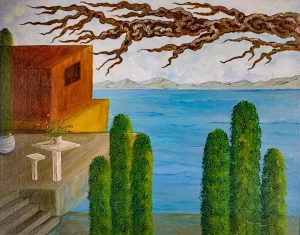History’s Mysteries Part 4 of 4 (links to Part 1, Part 2, Part 3)
For our last exploration into art mysteries, we tackle what some consider the biggest mystery of them all: Whether Shakespeare was the author of all that is Shakespeare! Sounds crazy, right?!
On we go with a little background and then the curious evidence:
SHAKESPEARE’S LIFE
William Shakespeare was born on April 23, 1564, in the town of Stratford-upon-Avon. His father was a craftsman (glove-maker) and held civic positions — so the family would be educated and well-to-do. At eighteen, Shakespeare married his already-pregnant wife, Anne (oh, the scandal!) and had four children.
We know he was first published in 1593 and was a member of an acting company, The Lord Chamberlain’s Men. We believe, from documents and statements made after his death, that he wrote plays and sonnets for over 20 years. Thirty-eight plays, 2 narrative poems, and 154 sonnets are attributed to him. We know from land records that he was wealthy and, in 1597, purchased the nicest house in his hometown.
Shakespeare is the most read author in history (published in English) and the most quoted author, second only to The Bible.
Not counting the modern versions of the plays, you would be surprised at the films you love that are just Shakespeare remakes:
- 10 Things I Hate About You (Taming of the Shrew)
- Deliver Us from Eva (Taming of the Shrew)
- Kiss Me, Kate! (Taming of the Shrew)
- West Side Story (Romeo and Juliet)
- Romeo Must Die (Romeo and Juliet)
- She’s the Man (12th Night)
- Just One of the Guys (12th Night)
- Get Over It (A Midsummer Night’s Dream)
- My Own Private Idaho (Henry IV)
- Men of Respect (Macbeth)
- O (Othello)
- The Lion King (Hamlet)
Shakespeare died on April 23, 1616. Yes, you read that correctly. Same day 52 years later. Always the dramatic.
ANTISTRATFORDIAN
Aside from all the hype, a number of scholars assert that William Shakespeare is not the author of the works credited to him. I recall hearing this theory in college–and that professor thought the true author might have been Queen Elizabeth!
These detractors are called “anti-stratfordians” because Shakespeare was from Stratford-upon-Avon. So they are anti-stratford.
Many famous people, including Mark Twain and Charlie Chaplin, argued that this common man without education or exposure to the world could have written the body of work.
Although Treasure contains a list of reasons for the inquiry, I can summarize some of them here:
- Shakespeare spelled his name in different ways on different documents with Shakspeare being the most used (not Shakespeare). His writing (the six examples that survive) is described as illiterate–and his parents and children were also illiterate. While the English language was not codified, per se, until later (the early 1600s), you would think a writer would have standard spellings — and would want his children to learn to read and write.

- He signed his will on March 25th, 1616 (rushed since he died a little under a month later)–and did not leave a single book, paper, manuscript, map, ledger or shelf to his heirs. In fact, he had none of the personal items we would expect a writer to own. On his will, another hand wrote a bequest to friends–and this interspersed line remains questionable. That bequest was directly to the men who would later, in honor and memorial, publish his supposed writings.

- Shakespeare is thought to have attended grammar school only–and his lack of higher education cannot explain his knowledge of Latin, The Classics, Law, etc. Or his 29,000 word vocabulary. The true author would either be highly educated — or several authors.
- Shakespeare is not known to have traveled–How could he know so much about Italy and the other countries about which he writes? If and when you read the plays, you will be surprised at how much he knows about Greece, Italy, and other foreign places. Again, the author must have been an aristocrat — or several authors.
- Shakespeare was not an aristocrat–yet knows details about that lifestyle. Including odd things like archery and the inner-workings of politics.
- We know Shakespeare was a businessman–and a real estate investor (property owner). Except that he was allegedly an actor, no other evidence of his involvement in the theater exists.
- The original monument to Shakespeare was the bust of a merchant–and later (seven years later) altered to that of a poet.

- When he died — as this prolific author — no honorarium, no public mourning… nothing appeared in the press. Crickets.
- His plays were published after he died in books called Folios. Only then was his name associated with the works.
You can read details at Absolute Shakespeare.
Alternative authors include Sir Edward de Vere (See: J. Thomas Looney‘s Shakespeare Identified), Queen Elizabeth, Sir Edward Dyer (See: Will Shakspere and the Dyer’s Hand) , Sir Francis Bacon, Henry Wriothesley (See: This Star of England), Christopher Marlowe (See: It Was Marlowe: A Story of the Secret of Three Centuries), or William Stanley.
The list goes on and on. Each of these aristocrats would have the lifestyle and education to pen such works–and many were already writers. The question is: Why hide oneself as the author of these popular plays?
Perhaps because the theater was considered “common” and the association with the theater would be unacceptable, aristocrats hid behind this common name. At least, that is what the anti-stratfordians argue.
The Stratfordians have strong arguments about why Shakespeare is The Bard and should remain so. They claim Shakespeare signed versions of his published poems published during his lifetime. They also assert that credit to the playwright was not common practice at that time. They also offer this interesting criticism: Antistratfordians cannot believe a common person could be a genius — that their theory is biased. Perhaps.
To the Anti-Stratfordians, too many unexplained and inexplicable facts bring Shakespeare’s role into question. Would it not make sense for a member of the aristocracy to hide behind another? What if the author was a woman? She would have to use an agent or a penname to publish her work. The questions are many — and without damning or key evidence, we will never know.
The strong evidence against the controversy may not be as fun as the mystery, but most of us — including David Tennant — don’t really care who wrote the masterpieces. We just enjoy them!



